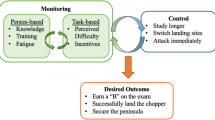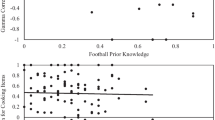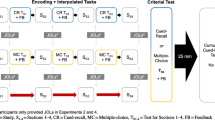Abstract
Most metacognition research has focused on aggregate judgments of overall performance or item-level judgments about performance on particular questions. However, metacognitive judgments at the category level, which have not been as extensively explored, also play a role in students’ study strategies, for example, when students determine what topics to study for an exam. We investigated whether category learning judgments (CLJs) were sensitive to differences in the difficulty of general knowledge categories. After either studying or being tested on facts from several categories (e.g., Shakespeare, Astronomy), participants estimated the likelihood that they could correctly answer new questions from those categories on a later test (i.e., they made CLJs). Results of two studies showed that CLJs were sensitive to differences in category difficulty. Further, participants gave lower or more conservative CLJs when they took an initial test as compared to studying questions from the categories. Results are discussed in terms of the value and relevance of CLJs both in educational settings and in theories of metacognition.

Similar content being viewed by others
Notes
Normative data was calculated using mean performance from an average of 290 participants who answered these same questions across a series of pilot experiments using trivia categories. In the pilot studies, the questions were always new to the experiment (i.e., participants has not encountered the question or answer previously) and presented in the same session as other questions from the same categories.
Higher proportion correct on the final test may be due to prior exposure to different questions from the same categories that participants previewed in the initial study/test phase.
References
Arbuckle, T. Y., & Cuddy, L. L. (1969). Discrimination of item strength at time of presentation. Journal of Experimental Psychology, 81, 126–131. doi:10.1037/h0027455.
Begg, I., Duft, S., Lalonde, P., Melnick, R., & Sanvito, J. (1989). Memory predictions are based on ease of processing. Journal of Memory and Language, 28(5), 610–632. doi:10.1016/0749-596X(89)90016-8.
Dukes, W. F., & Bevan, W. (1967). Stimulus variation and repetition in the acquisition of naming responses. Journal of Experimental Psychology, 74, 178–181. doi:10.1037/h0024575.
Finn, B., & Metcalfe, J. (2007). The role of memory for past test in the underconfidence with practice effect. Journal of Experimental Psychology: Learning, Memory, and Cognition, 33, 238–244. doi:10.1037/0278-7393.33.1.238.
Finn, B., & Metcalfe, J. (2008). Judgments of learning are influenced by memory for past test. Journal of Memory and Language, 58, 19–34. doi:10.1016/j.jml.2007.03.006.
Jacoby, L. L., Wahlheim, C. N., & Coane, J. H. (2010). Test-enhanced learning of natural concepts: effects on recognition memory, classification, and metacognition. Journal of Experimental Psychology: Learning, Memory, and Cognition, 36, 1441–1451. doi:10.1037/a0020636.
Karpicke, J. D. (2009). Metacognitive control and strategy selection: deciding to practice retrieval during learning. Journal of Experimental Psychology: General, 138(4), 469–486.
Karpicke, J. D. (2012). Retrieval-based learning: active retrieval promotes meaningful learning. Current Directions in Psychological Science, 21, 157–163. doi:10.1177/0963721412443552.
Karpicke, J. D., Butler, A. C., & Roediger, H. L. (2009). Metacognitive strategies in student learning: do students practise retrieval when they study on their own? Memory, 17, 471–479. doi:10.1080/09658210802647009.
Kelley, C. M., & Jacoby, L. L. (1996). Adult egocentrism: subjective experience versus analytic bases for judgment. Journal of Memory and Language, 35, 157–175.
Koriat, A. (1997). Monitoring one’s own knowledge during study: a cue-utilization approach to judgments of learning. Journal of Experimental Psychology: General, 126, 349–370.
Koriat, A., & Bjork, R. A. (2006). Mending metacognitive illusions: a comparison of mnemonic-based and theory-based procedures. Journal of Experimental Psychology: Learning, Memory, and Cognition, 32, 1133–1145. doi:10.1037/0278-7393.32.5.1133.
Koriat, A., Sheffer, L., & Ma’ayan, H. (2002). Comparing objective and subjective learning curves: judgments of learning exhibit increased underconfidence with practice. Journal of Experimental Psychology: General, 131, 147–162. doi:10.1037/0096-3445.131.2.147.
Koriat, A., Bjork, R. A., Sheffer, L., & Bar, S. K. (2004). Predicting one’s own forgetting: the role of experience-based and theory based processes. Journal of Experimental Psychology: General, 133, 643–656.
Kornell, N., & Bjork, R. A. (2007). The promise and perils of self-regulated study. Psychonomic Bulletin & Review, 14, 219–224. doi:10.3758/BF03194055.
Kornell, N., & Metcalfe, J. (2006). Study efficacy and the region of proximal learning framework. Journal of Experimental Psychology: Learning, Memory, and Cognition, 32, 609–622. doi:10.1037/0278-7393.32.3.609.
Kornell, N., Rhodes, M. G., Castel, A. D., & Tauber, S. K. (2011). The ease-of-processing heuristic and the stability bias dissociating memory, memory beliefs, and memory judgments. Psychological Science, 22, 787–794.
Lichtenstein, S., & Fischhoff, B. (1977). Do those who know more also know more about how much they know? Organizational Behavior and Human Performance, 20, 159–183. doi:10.1016/0030-5073(77)90001-0.
Meeter, M., & Nelson, T. O. (2003). Multiple study trials and judgments of learning. Acta Psychologica, 113, 123–132. doi:10.1016/S0001-6918(03)00023-4.
Metcalfe, J. (2009). Metacognitive judgments and control of study. Current Directions in Psychological Science, 18, 159–163. doi:10.1111/j.1467-8721.2009.01628.x.
Metcalfe, J., & Finn, B. (2008). Evidence that judgments of learning are causally related to study choice. Psychonomic Bulletin & Review, 15, 174–179. doi:10.3758/PBR.15.1.174.
Metcalfe, J., Schwartz, B. L., & Joaquim, S. G. (1993). The cue-familiarity heuristic in metacognition. Journal of Experimental Psychology: Learning, Memory, and Cognition, 19, 851–864. doi:10.1037/0278-7393.19.4.851.
Nelson, T. O., & Narens, L. (1980). Norms of 300 general-information questions: accuracy of recall, latency of recall, and feeling-of-knowing ratings. Journal of Verbal Learning and Verbal Behavior, 19, 338–368. doi:10.1016/S0022-5371(80)90266-2.
Rhodes, M. G., & Castel, A. D. (2008). Memory predictions are influenced by perceptual information: evidence for metacognitive illusions. Journal of Experimental Psychology: General, 137, 615–625. doi:10.1037/a0013684.
Son, L. K., & Metcalfe, J. (2000). Metacognitive and control strategies in study-time allocation. Journal of Experimental Psychology: Learning, Memory, and Cognition, 26, 204–221. doi:10.1037/0278-7393.26.1.204.
Thiede, K. W., Anderson, M. C. M., & Therriault, D. (2003). Accuracy of metacognitive monitoring affects learning of texts. Journal of Educational Psychology, 95, 66–73. doi:10.1037/0022-0663.95.1.66.
Wahlheim, C. N., Dunlosky, J., & Jacoby, L. L. (2011). Spacing enhances the learning of natural concepts: an investigation of mechanisms, metacognition, and aging. Memory & Cognition, 39, 750–763. doi:10.3758/s13421-010-0063-y.
Wahlheim, C. N., Finn, B., & Jacoby, L. L. (2012). Metacognitive judgments of repetition and variability effects in natural concept learning: evidence for variability neglect. Memory & Cognition, 40, 703–716. doi:10.3758/s13421-011-0180-2.
Acknowledgments
This research was supported by Grant 22020166, Applying Cognitive Psychology to Enhance Educational Practice, from the James S. McDonnell Foundation, awarded to Larry L. Jacoby. We are grateful to Chris Wahlheim for his input the procedure as well as Rachel Teune and Kara Chung for their assistance with data collection and data scoring.
Author information
Authors and Affiliations
Corresponding author
Rights and permissions
About this article
Cite this article
Thomas, R.C., Finn, B. & Jacoby, L.L. Prior experience shapes metacognitive judgments at the category level: the role of testing and category difficulty. Metacognition Learning 11, 257–274 (2016). https://doi.org/10.1007/s11409-015-9144-4
Received:
Accepted:
Published:
Issue Date:
DOI: https://doi.org/10.1007/s11409-015-9144-4




